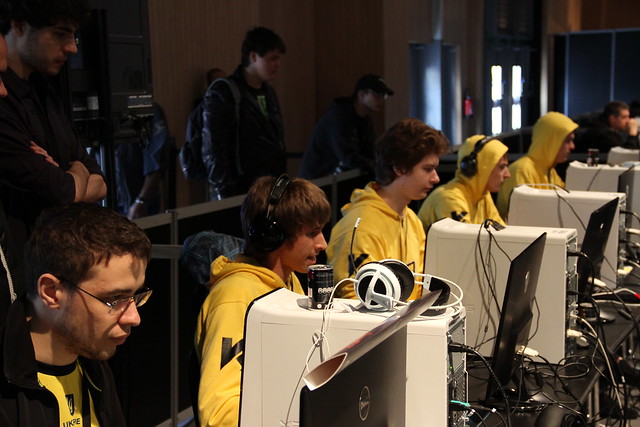eSports and other drugs

Two weeks have passed since Valve’s Dota2 million dollar tournament, The International, concluded and people are still in awe. The final match between iG and Na’Vi resulted in the victory of the Chinese squad due to the excellent TA plays by Ferrari_430 and the risky strategies adopted by Puppey, the captain of the Ukrainian team, who picked a controversial Nyx Assasin in the last game *gasp*…oh wait, you probably have no idea what I am talking about. Judging by my furious enthusiasm though, you may notice it is something pretty important for me and millions of other people around the world.
Let’s start with a question. What do Dota2, as well as many other MOBAs (Multiplayer Online Battle Arenas), real-time strategy games like Starcraft, shooters like Counter Strike and sports games like FIFA have in common? They can all become eSports, a.k.a electronic sports if they are played competitively, as a shared experience between developers, players, commentators and viewers.
Most games that are treated and played as eSports are built for casual gamers too so you shouldn’t be afraid to try any of them if you are not ‘initiated’. They are called sports because they require skill (talent/practice +acquired knowledge of the game mechanics), good reflexes, fast thinking and decision-making. You can say eSports are a lot like chess in this respect, as the only muscle needed is the brain. Chess, much like Starcraft 2, is a game where you can learn strategies and patterns which can guarantee you a positive outcome if you do everything right. There are very few human minds that can learn all the possible tactics but they have all been figured out and exist out there if one wants to access them. Starcraft 2 players know that a game is lost if they don’t attain certain objectives by a certain time mark, that’s why they have to move very fast and efficiently. Their average number of actions per minute is over 150, while a casual player can only master about 50. Still, most MOBA games like Dota2 or League of Legends are unpredictable and the meta-game, or game balance if you wish, shifts constantly as there are so many variables and combinations both human (player skill and focus) and virtual (heroes picked, skills and items built) no complex algorithm can anticipate the result. That does not mean it is a matter of luck but it means these games have a steep learning curve as there is no set of basic rules that will ensure your success, but years of practice and reflection upon your games.

Who plays these then? In South Korea, being a pro gamer is a high-profile job, they are famous like movie stars and well-paid like bankers while Starcraft competitions are aired on national television. As for the rest of the world, some would recognize the pro gamer as a guy, either skinny or very fat, who wears goggles, has bloodshot eyes and pale skin, symptoms of sleep deprivation, obvious consequences of a sedentary life. This stereotype is not far from the truth, but it shouldn’t be generalized. Most of these people do have lives, contrary to the popular belief; they have day jobs or study at university, playing mostly at night. Being a gamer is much like being an athlete though, at a certain age you have to retire; many pro gamers accuse carpal tunnel disease or back problems. It’s like football with keyboards! That is why investing all your time in pro gaming may be damaging for your health and future prospects. Sadly, for the amount of time they invest in the game, they are underpaid and most of their money comes from won tournaments or streaming their games. Their respective sponsors and organizations do pay for their accommodation and transport when they travel to LAN events and players most often get free computer equipment in order to have competitive playing conditions, so the situation is not as bleak as it sounds.
I tried to get my mother initiated into eSports and she begged for mercy 5 minutes into my fervent speech. That is not to say that the content is not attractive enough, but explaining everything one needs to know requires a lot of patience from both parties. eSports are like an alternate universe, a place where people’s identities are hidden behind quirky nicknames but a place where everyone feels like they belong. The companies encourage it, forums and websites spread it, commentators and analysts discuss it and make it accessible to the audience. It is an experience, a network connecting like-minded people; like Facebook without the duck-faces. Whenever you find someone who has the same addiction you start a diabolical rant of retelling past games and crazy situations which, if witnessed by somebody who has no clue, would seem like a different language. Yes, eSports is a language, a collective memory, a society.

Three words about eSports in the future: WILL BE HUGE. I call eSports Olympics before anyone else has the chance. With that much money invested in the industry, making and promoting games, putting millions of dollars in prize money for the competitions they organize, it is obvious this is not going to stop here. And the best part is, most of their games are free to play, which makes the community grow more and more every year and you, yes, even you can be a part of it. It’s just a mouse click away.
